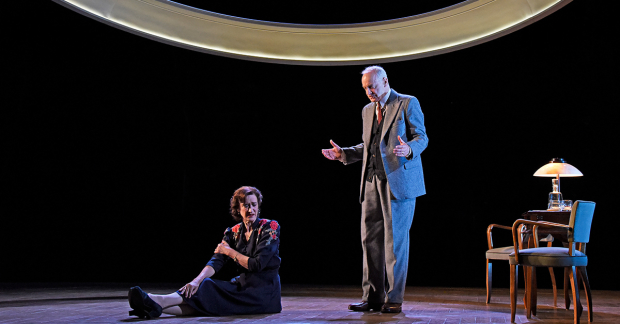
© Nobby Clark
Inevitably perhaps in such uncertain times, the return of theatre has felt tentative. There has been a heart-warming rush to be back sharing space with actors and audience alike, but intellectually at least, little has stretched. So, it's a joy to report that Michael Frayn's 1998, knotty, thorny masterpiece Copenhagen has finally landed in Bath. This alone deserves our plaudits. Originally programmed for the theatre's return last Autumn, in a production directed by Polly Findlay, a new lockdown was announced while the show was still in tech, the show getting only as far as a dress rehearsal before being put back into storage, returning with assistant Emma Howlett having now taken over the mantle of steering the ship.
This turnover appears to have done no harm to the production, which confirms the work as one of the great late 20th Century plays, and provides platforms for some excellent performances, in particular from Haydn Gwynne and Malcolm Sinclair as Margrethe and Niels Bohr, a Danish scientist and his wife, who received an officially documented visit from former protégé Werner Heisenberg (Philip Arditti) in 1941 in Copenhagen.
What exactly was discussed at this meeting in which a fracture between the relationship seems to have occurred, has always been clouded in mystery and is at the heart of Frayn's text. Heisenberg, the bright young thing of scientific discovery, the pioneer of the uncertainty theory, and at the heart of Nazi Germany's nuclear programme, never created an atomic bomb for the Nazis. Was this a heroic attempt to bluff a dangerous paymaster to save the catastrophic destruction of many? Or a fateful misjudgement in his calculations that meant he had decided it was all but impossible? There is a Brechtian spin on a work that posits that the Allie Bohr was at least indirectly responsible for the deaths of hundreds of thousands in Hiroshima, having assisted the allies in supporting the creation of the bomb, while the Nazi working Heisenberg was not responsible for a single death. What could have become a dry thesis play, has knotty propositions like this all night.
Frayn's play spins it into ever-increasing expressionistic circles. The three characters are reunited in the afterlife, to replay, rethink and re-explore that fateful evening in 1941. When the characters want to view the incident again from another angle, a different viewpoint, they ask for a ‘different draft'. Findlay and Howlett's production, finds something of this spiritual outpost where time and place don't exist, in some neat stage pictures, the characters debating in triangles in Alex Eales, stripped back set, the theatre's back walls exposed in another Brechtian nod.
Sinclair is all fatherly kindness, a constant hand going to the back of his young protégé, as a decent man-made to reckon with his life hand, not only in his contribution to a weapon that ended a war but to the death of his son in a drowning incident. You feel the symbiotic importance of the relationship with his young German colleague, to who Arditti invests a nervous energy, ideas spilling out of him at a pace almost too quick for him to comprehend. Gwynne meanwhile is impervious- she is a magnificent stage creature- constantly blocked to be at the base of the debate, but gradually taking on its moral centre. All decisions are personal she exclaims, getting to the heart of Frayn's work, that takes on big questions of science and finds an intimate touch. It's a night where concentration is imperative, but one where you leave the theatre with mind racing at the ideas and debates and with a stronger sense that finally, theatre, in all its knotty complexities is back.












